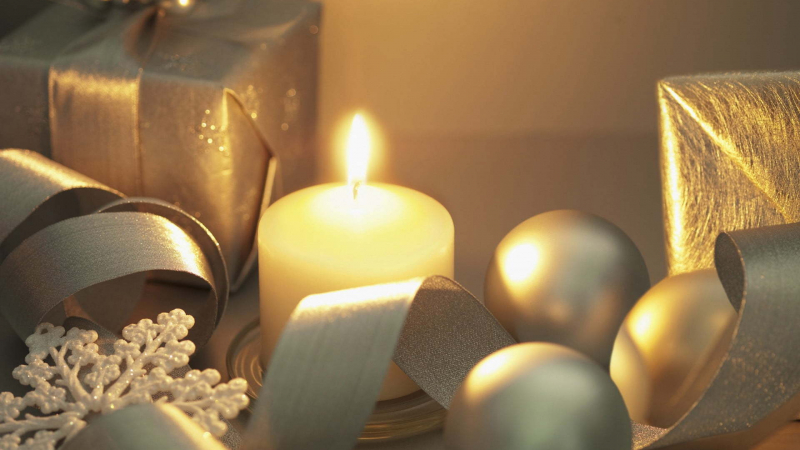When Violet Fades to White

About a year ago, Veritas Press ran a blog series about the church calendar’s season of Advent. Much in the world has changed in the past twelve months. Our need and our longing for the Savior haven’t. With countless Christians through the ages, we join our hearts in singing, “Rejoice! Rejoice! Emmanuel has come to thee, O Israel!”
You’re clearing the last dessert plate from the table, and they’re giving folks a last hug. You’re ready to pour another cup of decaf; they’re ready to pour out the front door. Those who host Thanksgiving gatherings recognize the distinctive behavior as a classic dine-and-dash. Say what you will, you can’t get the dashers to stick around much longer than their last swill and swallow. Guests who bolt after a Thanksgiving meal may be eager to get home before sundown. They may also feel a boldness brewing to brave the brawls of Black Friday bargains.
What the dine-and-dash is to Thanksgiving, the trash-and-dash is to Christmas. The family gathers around the tree on Christmas morn—mama still in her ’kerchief, papa still in his cap. After weeks of waiting, Barney and Ben tear into their foiled and tissued presents. Bows, ribbons, and tape shards fly. Within a half hour, ripped wrapping paper piles higher than drifts of new-fallen snow.
Fuzzy sweaters spring from their boxes, and warm socks spill from their bags. Children thank Mom and Dad with stretched smiles and sparkling eyes. Children understand that socks and sweaters from their parents say “We love you and want what’s best.” Of course, kids have their own ideas about what conveys that message even better. Gift cards for whipped lattes and waffle fries do, as do bright and shiny new gadgets.
Soon after the morning’s unwrapping frenzy finishes, the family settles in for a long winter’s nap. All settle in but Janice and Jen. They’re making plans with friends to queue up in the holiday’s hectic return lines. For many—children and parents alike—the day after Christmas signals the start of a new season. On December 26 begins the great wintertime festival of returns and exchanges.
Christians who observe the church calendar see Christmas as the start of a new season, too. Advent’s several weeks of subdued reflecting give way to a new season of feasting and rejoicing. Several weeks of pointing to our problems lead to a season of proclaiming God’s solution. The preparatory period of Advent comes to an end on the eve of December 24th. By the time it arrives, we’re ready, yearning, to sing “Come, Thou Long Expected Jesus!” On Advent IV, the Sunday just before Christmas, we light the last colored candle on our wreath. A traditional prayer for the day captures the sin-laden soul’s longing for the Lord’s salvation:
Stir up your power, O Lord, and with great might come among us; and as we are sorely hindered by our sins from running the race that is set before us, let your bountiful grace and mercy speedily help and deliver us; through Jesus Christ our Lord, to whom, with you and the Holy Spirit, be honor and glory, now and forever.
In Advent, we reflect on why we need a savior. In the joyous season that follows, we celebrate that the Son of God became flesh and dwelt among us. Many Christians refer to that twelve-day season as Christmastide. It begins on Christmas Day and ends on the evening of January 5th, commonly known as Twelfth Night. (The following day is Epiphany, the start of the next season in the church year. That’s a topic for a different series.) Some see Christmastide’s twelve days as a symbol of God’s saving presence with us every month of the year.
At Christmas, we retell the story of Christ’s birth. We try to imagine Mary and Joseph, shepherds and angels, a bright star and a lowly manger. We’ll ponder anew that the Lord of glory veiled Himself in humanity to redeem humanity. The season also invites us to see that the gift God gave at Bethlehem is a gift that keeps giving. When we celebrate Christ’s birth, we do more than commemorate that the Lord did come. We proclaim at Christmas a loud and jubilant “Joy to the world!” because “the Lord is come.”
Jesus was no mere historical figure; He is the Lord of time and space. He didn’t come to deliver a handful of Galilean disciples. He came to set all His people free. The baby born to Mary was no ordinary infant. He had little eyes, little hands, and little feet, but He was the Son of God, the one by whom all things were made. He slept in swaddling clothes and lay in a first-century Judaean manger. Still, He was Emmanuel, “God with us”—all of us—there and then, here and now. Nineteenth-century pastor Phillips Brooks expressed the truth of our ever-present Savior this way:
How silently, how silently,
the wondrous gift is giv’n!
So God imparts to human hearts
the blessings of his heav’n.
No ear may hear his coming,
but in this world of sin,
where meek souls will receive him still,
the dear Christ enters in.
O holy child of Bethlehem,
descend to us, we pray;
cast out our sin and enter in;
be born in us today.
We hear the Christmas angels
the great glad tidings tell;
O come to us, abide with us,
our Lord Emmanuel!
Has your family begun any new Advent traditions this year—a wreath, devotions, a calendar? If so, here are some suggestions for how to make the upcoming week even more special:
- Start each day’s devotions by lighting all four colored candles on your wreath. Once the Christmas season arrives, light the white candle in the center, too. While lighting the candles . . .
-Did you make an Advent calendar as mentioned in the last post? If so, have your children continue to name something they’re hopeful for/thankful for (Advent calendars end on December 24, but you can observe this practice every day of every year.)
-Sunday through Thursday, have a family member read the Advent IV prayer above. Friday and Saturday, read this prayer, instead:
“O God, you caused a holy night to shine with the brightness of the true Light: Grant that we, who have known the mystery of that Light on earth, may also enjoy him perfectly in heaven; where with you and the Holy Spirit he lives and reigns, one God, in glory everlasting.”
- Read Scripture according to the following plan. You may wish to sing or listen to one or more Advent/Christmas carols each day. Ever heard “O Come, O Come, Emmanuel” sung by Hymns and Hers?
- Dec. 20 > 2 Sam. 7:1–17
- Dec. 21 > Ps. 132:8–19
- Dec. 22 > Rom. 16:25–27
- Dec. 23 > Luke 1:26–38
- Dec. 24 > Matt. 1:18–25
• King’s College Chapel, Cambridge, celebrates Christmas Eve with a special service. The century-old service is called A Festival of Nine Lessons and Carols. It opens with a child soloist singing “Once in Royal David’s City.” If you’re not familiar with the hymn (or the service), it’s well worth your family’s listening.
- Dec. 25 > Luke 2:1–20
• Sing every Christmas carol you know! Need some suggestions?
- Dec. 26 > Titus 3:4–7
• Ready to add a new song to your family’s listening repertoire? Consider Jan Sweelinck’s 1619 “Hodie Christus natus est” (“Today Christ is born”). For an engaging multitrack rendition, check out this recording. An English translation of the Latin original is available here.
- Discuss the day’s passage, and as the week unfolds, talk about how the passages read weave a unified message.
- End your time together with song (“O Come, All Ye Faithful,” perhaps) and prayer. Christmas Day and the day following, this prayer may be especially suitable:
“Almighty God, you have given your only-begotten Son to take our nature upon him, and to be born of the Virgin Mary: Grant that we, who have been born again and made your children by adoption and grace, may daily be renewed by your Holy Spirit; through Jesus Christ our Lord, to whom with you and the same Spirit be honor and glory, now and forever.”
This Sunday, many Christians will light the last violet candle on their wreaths. They’ll remind themselves of their souls’ need, of all the ways they fall short of God’s glory. Five days later, they’ll light their wreaths’ sole white candle. They’ll rejoice that in Jesus Christ, God provided us a Savior. On Christmas, we’ll remember that He who said “I am the light of the world” is the one who dispels our darkness. He is the Gift who keeps giving, the one who alone can satisfy a soul’s deepest longings. O come, all you faithful! Let us adore the one who can turn all life’s purple candles white.







